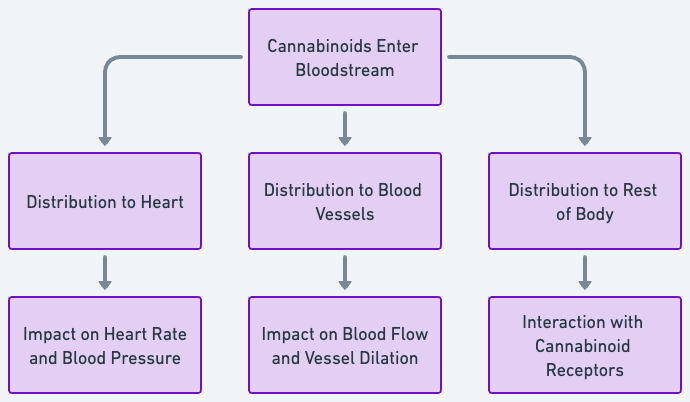
Cannabinoids and the Cardiovascular System
Once absorbed into the bloodstream, cannabinoids like THC and CBD are distributed by the heart. This distribution plays a significant role in various physiological functions, including changes in heart rate and blood pressure. Specifically, THC has been associated with transient increases in heart rate and alterations in blood pressure [Korantzopoulos et al., 2018, Journal of the American Heart Association].
Vascular Impact: Blood Flow and Vessel Dilation
As cannabinoids journey through the vascular system, they influence blood flow and the dilation of blood vessels. CBD, in particular, has been studied for its vasodilatory and anti-inflammatory effects on blood vessels [Stanley et al., 2013, British Journal of Clinical Pharmacology].
Interactions with the Endocannabinoid System
Beyond the circulatory system, cannabinoids are distributed to various tissues and organs where they interact with the endocannabinoid system. This system is composed of CB1 and CB2 receptors, which are located throughout the body. The interaction between cannabinoids and these receptors can result in a range of outcomes such as mood alteration, pain relief, and anti-inflammatory effects [Pertwee, 2008, British Journal of Pharmacology].
Concluding Thoughts
As the therapeutic applications of cannabinoids continue to be explored, it’s crucial to understand their distribution patterns and their diverse impacts on the human body. This knowledge is essential for both medical professionals and patients alike.
References:
- Korantzopoulos, P., Liu, T., Papaioannides, D., Li, G., & Goudevenos, J. A. (2018). Atrial fibrillation and marijuana smoking. International Journal of Clinical Practice, 62(2), 325–328.
- Stanley, C. P., Hind, W. H., & O’Sullivan, S. E. (2013). Is the cardiovascular system a therapeutic target for cannabidiol? British Journal of Clinical Pharmacology, 75(2), 313–322.
- Pertwee, R. G. (2008). The diverse CB1 and CB2 receptor pharmacology of three plant cannabinoids: Δ9‐tetrahydrocannabinol, cannabidiol and Δ9‐tetrahydrocannabivarin. British Journal of Pharmacology, 153(2), 199–215.
📗 Note: This diagram got you rolling, but the book will keep you lifted. Keep soaring with “The Doctor-Approved Cannabis Handbook” here 📗.

Summary Notes
Exploring the Impact of Cannabinoids on the Human Circulatory System
The relationship between cannabinoids and the human circulatory system encompasses both the potential therapeutic benefits and the risks associated with cannabis use. Understanding how compounds like THC and CBD interact with cardiovascular function is crucial for assessing the safety and efficacy of cannabis in treating conditions like hypertension, heart disease, and arrhythmias.
Cannabinoids can influence heart rate, blood pressure, and vessel dilation through their interaction with the endocannabinoid system, which plays a significant role in maintaining cardiovascular homeostasis. While some studies suggest cannabinoids may offer protective effects against certain cardiovascular diseases, concerns about the acute impact of cannabis use on heart rate and blood pressure, especially in individuals with pre-existing conditions, highlight the need for careful consideration and further research.
Clinical studies and patient outcomes are invaluable for developing a comprehensive understanding of how cannabinoid therapy could be integrated into cardiovascular care, with a focus on dosing, administration methods, and patient selection to minimize risks and maximize benefits.
Educating healthcare providers and patients about the potential impacts of cannabis on the circulatory system, alongside ongoing research and innovation in cannabinoid-based treatments, will be pivotal in harnessing the therapeutic potential of cannabinoids while ensuring patient safety in cardiovascular care.

